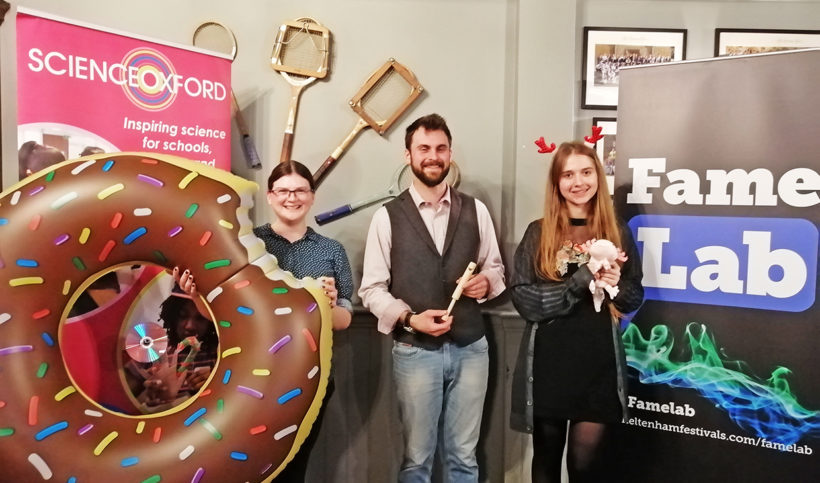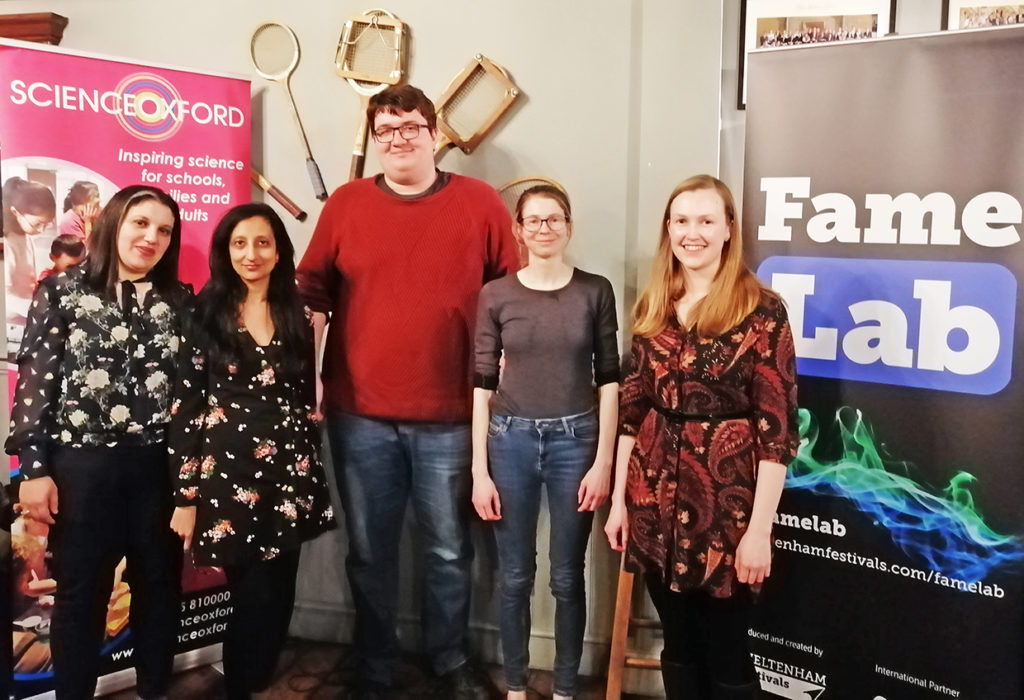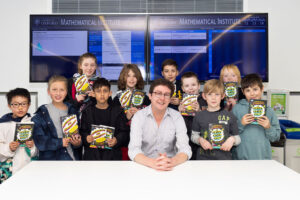FameLab back with a Bang – Oxford’s battle of the brains begins
Monday 17th February 2020

This February, we put science centre-stage and hosted FameLab UK’s first round of Oxford heats, where sci-curious stars of the future battle it out for a place in the nation’s favourite science competition, in partnership with Cheltenham Festival. With the help of makeshift props and witty bants, thirteen contestants had just three minutes to entertain the crowd at St Aldates Tavern, and win over our judges with hot topics from doughnut-shaped black holes to space weather and nanorocket drug delivery.
Judges tasked with spotting sci-comm stars of the future included our trustee Lynne Pebworth, John Runions – a BBC Radio Oxford regular guest and molecular biologist who ‘likes to make things glow’, and last year’s regional winner and national runner up, Sam Hatfield, a weather scientist who we’ll blame for the timely arrival of Storm Chiara. They guided us through Chiara, and also the other three big Cs to look out for – Content, Charisma, and Clarity. The heats were ably compered by Science Oxford’s own Kat Kelly and Ian Snell, who swapped their ‘usual crowd’ of primary school children to keep in line our bunch of researchers, students, lecturers, a pharmacist, and even a stand-up comedian.
Our events officer Rowena Fletcher-Wood tells the tale with one of her legendary poems…
Danielle Perro discussed how we perceive pain,
And asked why women’s health issues still remain
Under the radar. It’s no bed of roses
To suffer the “reverse-period” endometriosis.
Maria Violaris passed from her brain to ours
Something material – information: a power
Behind the engine the future, which she helped us understand
When 30 people raised up a hand.
Hanene Ali-Boucetta delivered to target:
Drug treatments to cells with her nanorocket.
And when cells get defensive and start in a strop,
She’s sending in drugs that will not just stop.
Nicola Hall has seen your molecules.
(Well, not yours yet – that’s against the rules).
And whilst she’d love to spy on thoughts in the brain
She works with dead ones, a half gram unnamed.
Shaun Dempsey warned us of a forgotten threat
150 million kilometres away, yet
It’s about the same risk as pandemic ‘flu –
Solar wind and space weather could affect you.
Tamsin Cargill the T cell came to stage to recruit
More T cells like herself to join the pursuit
Against the knackering virus hepatitis
Her clinical trials are under analysis.
Isa Bonachera can’t make the weather relent,
But conjures up solar vortices and stratospheric events.
And brings in sea turtles, which as global temps rise
Are more and more often female – a warming (?) surprise.
Maleeha Bari does not hesitate to address
Vaccine hesitancy and respecting those who express
It. Live ‘Conservative’ vaccines are not good for the weak
But attenuated ones could be just the tweak!
Tom Gregory waged war on the sea god, like Caligula.
The supercomputer age dawned, but it seemed we need Moore:
Algorithms to model the ocean, but he’s fixed
It up fine: we’ll chop up the ocean into thin Lego bricks!
Molecular architect Chris Marsh has made sponges
To exude pheromones that he hopes will expunge
Chemical pesticides and instead target species
For better biodiversity and food security.
Bella Boulderstone brings a doughnut-shaped black hole to our sight
And the audience absorb and re-emit her light
As she demonstrates how time delay can irons out the wrinkles
Of the Father Ted problem using dusty sprinkles.
Alicia Carrington and axolotl fan
Is making stem cells and explains how these can
Help us regrow lost limbs like the flatworm or salamander
A skill we’ve devolved, but perhaps not for much longer!
Mike Richardson stimulates our visual cortexes
To create vision-like images from sound that perplexes.
Why do we all think that lemon is fast?
We don’t yet know – is it inborn or culturally amassed?
The Winners
Come and cheer on the contestants through to the regional finals at the Science Oxford Centre, 6thMarch, where we’ll be joined by judges Irene Tracey, Professor of Anaesthetic Neuroscience, University of Oxford, Patrick Roche, Professor of Physics, University of Oxford, Lynne Pebworth, Trustee, The Oxford Trust and our compère Lucy Rogers, science author, inventor, and a judge on the BBC2 show Robot Wars. Interval act will be Matt Tompkins, experimental psychologist and a professional magician. The winner will go on to compete at the national heats in the summer, with the finals taking place at the Cheltenham Festival.

Congrats to the contestants through to the Oxford regional finals:
Bella Boulderstone MSc Archaeological Science student at University of Oxford
Michael Richardson psychology PhD student at Bath
Alicia Carrington Masters student in neuroscience
Maleeha Bari medication safety pharmacist and pharmacy flu lead for the Mental Health Trust in Oxford
Tamsin Cargill medicine loving runner
Danielle Perro DPhil student studying in the Nuffield Department of Women’s and Reproductive Health.
Nicola Hall molecular biology researcher at the University of Oxford Department of Psychiatry
Maria Violaris 4th year physics undergraduate at Oxford specialising in quantum physics
Hanene Ali-Boucetta lecturer in Pharmaceutical Nanoscience at the School of Pharmacy, University of Birmingham.
Thomas Gregory Mathematics PhD student at Imperial College


